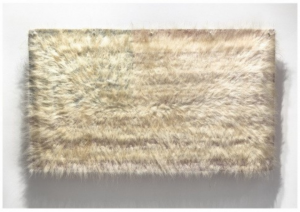CAA News Today
CWA Picks for July 2020
posted Jul 28, 2020

Sonya Kelliher-Combs (Native American, b. 1969) Mark, Polar Bear, 2019. Acrylic polymer, polar bear fur, fabric flag, metal brackets, 40 x 65 in. © 2019 Sonya Kelliher-Combs. Courtesy of the artist and Minus Space.
In response to COVID-19, artists, institutions, and organizations have initiated virtual exhibitions, presentations, screenings, and curated newsletters, among other innovative approaches, welcoming the public to online platforms and opening dialogues on a range of topics. May and June 2020 CWA Picks presented a number of initiatives that demonstrated ways in which social media channels and websites can be repurposed in light of social distancing measures currently in place; these Picks emphasized the social role of the arts as a healing positive force during these challenging times. As protests about systemic racism and structural injustices raged globally, museums and institutions were inclined to acknowledge their fundamental accountability and engagement in the misrepresentation or excision of Black and Indigenous histories from white imperialist and colonial narratives, including the prevalent or implicit use of racist language and practices. As the world witnesses and participates in “good trouble” and social unrest, our July Picks cover a range of online and in-person exhibitions and events and strike a balance between feminist ecologies of care and political activism. At this unprecedented historical juncture, some art spaces have opened their doors to audiences and slowly resumed activities, enforcing precautions and timed visits:
- ecofeminism(s) curated by Monika Fabijanska at Thomas Erben Gallery (7.19.20-7.24.20) takes us on a visual journey of the pioneering environmental art works of the 1970s and 80s through the present. Countering patriarchal and corporate structures and philosophies, many artists engage scientific and analytic approaches to experimental practices, utilizing photographic documentation, archives, time-based media, and ritual performances. Advancing principles of spiritual feminism, feminist metaphors of the Great Goddess and Cosmic Mother, and anti-nuclear activism, among other social and technological positions, the early eco–feminists underscore earth’s fragility and vulnerability—thinly veiling our fears and prophetically imagining our current global crises and pandemic—yet glimmers of care, community, and agency strikingly emerge. As an intergenerational show presenting contemporary women artists making ecological art, Fabijanska proposes, “What makes today’s female environmental artists ‘ecofeminists’?” Artists include Andrea Bowers, Helène Aylon, Eliza Evans, Sonya Kelliher-Combs, Hanae Utamura, Betsy Damon, Aviva Rahmani, Jessica Segall, Lynn Hershman Leeson, Bilge Friedlaender, Carla Maldonado, Mary Mattingly, Cecilia Vicuña, Barbara Kruger, and Agnes Denes. Public programming with Zoom conversations between artists, art historians, and critics: July 8, July 15, and July 22.
- Earthkeeping, Earthshaking – art, feminisms and ecology (Earthkeeping/Earthshaking – arte, feminismos e ecologia), curated by Giulia Lamoni and Vanessa Badagliacca at Galerias Municipais (Galeria Quadrum) in Lisbon (7.25.20-10.4.20) takes its title from the thirteenth issue of the pioneering US feminist art magazine called Heresies (1981) published by the feminist collective. Lucy Lippard, Ana Mendieta, and Faith Wilding, among other contributors to this issue, raised complex points around the following question: ‘What can women do about the disastrous direction the world is taking?’ Curators Lamoni and Badagliacca return to this pressing question in a global 21st-century context by reframing ideas of capitalism, colonialism, and current environmental pressures, further exploring a Portuguese perspective. Earthkeeping, Earthshaking presents radical feminist artists from the 1970s through the present day: Alexandra do Carmo, Alicia Barney, Ana Mendieta, Bonnie Ora Sherk, Cecilia Vicuña, Clara Menéres, Emilia Nadal, Faith Wilding, Gabriela Albergaria, Gioconda Belli, Graça Pereira Coutinho, Irene Buarque, Laura Grisi, Lourdes Castro. Maren Hassinger, Maria José Oliveira, Mónica de Miranda, Rui Horta Pereira, Teresinha Soares, Uriel Orlow.
- AWARE (Archives of Women Artists Research & Exhibitions) has launched the podcast Woman House in response to the pandemic. Each episode invites a female narrator to read stories and texts by women writers on the broad theme of confinement. For example, hear Virginia Woolf’s To the Lighthouse read by Julie Wolkenstein; Céleste Albaret’s Monsieur Proust read by Jeanne Balibar; and Marguerite Dumas’s Writing read by Camille Morineau.
- Virtual Views: Faith Ringgold at MoMA explores Ringgold’s extraordinary position in the sixties as an African-American woman painter and offers personal commentary about cultural identity and documentation during the civil rights movement. Ringgold’s American People Series #20: Die, a masterpiece from the museum collection, visualizes the realities of race, police brutality, and violence, and makes direct references to Picasso’s Guernica.
- Not Yet Written Stories is an online archival repository of avant-garde women artist practices (documentation, exhibitions, conferences, publications), supported by workshops and conferences. Managed by the SCCA-Ljubljana Center for Contemporary Arts, Arton Foundation, Warsaw, and Latvian Center for Contemporary Art (Riga), Office for Photography, Zagreb.
- Whitechapel Gallery offers an instructional list of audio resources (podcasts and audiobooks) on Black Lives Matter.
- Carla Repice: The White Problem Redux, an online exhibition at Equity Gallery, highlights the “optics of whiteness and the ways in which white supremacy virally replicates itself in visual culture,” according to the accompanying online essay by Ronika McClain. Repice’s intimate, gestural figurative paintings unveil quick glimpses into childhood, focused sharply on youth and education as primary source material for the formulation of implicit racism, symbols, and narratives. Public programming includes a series of poetry readings by Black writers, organized by poet Maya Pindyck.


